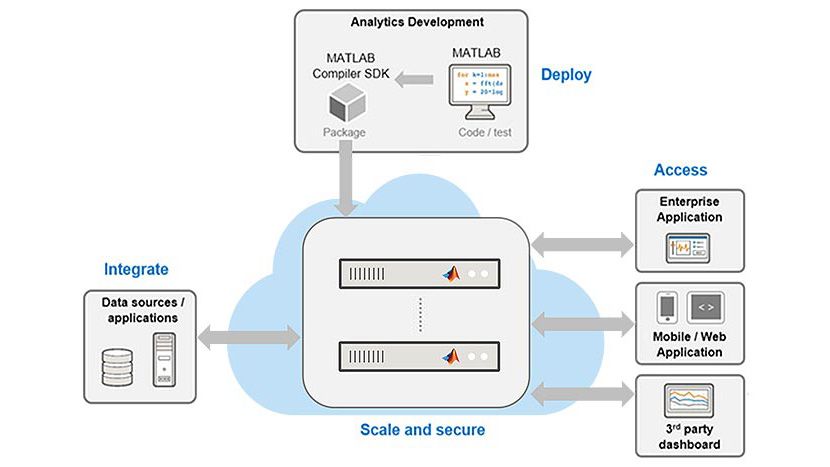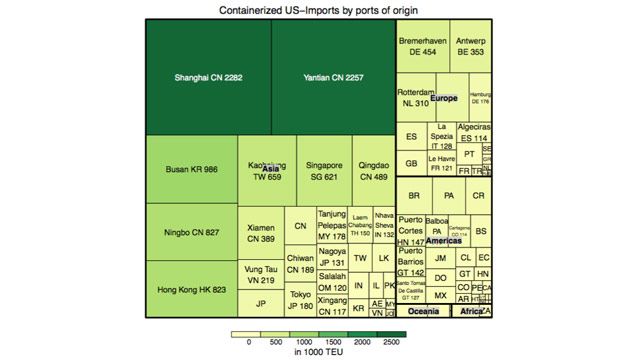Using MATLAB®and Simulink®in the cloud enables engineers and scientists to speed up their development processes by providing on-demand access to enhanced compute resources, software tools, and reliable data storage. You can:
- Get instant access to MATLAB and Simulink in a web browser usingMATLAB Online®andSimulink Online®
- Connect your MATLAB code to cloud data and other services from Amazon Web Services®(AWS), Microsoft Azure®, and more
- Scale your long-running computations and simulations to CPUs, GPUs, or compute clusters in the cloud
- Integrate MATLAB with your cloud-based continuous integration systems to automate code testing and improve code quality
- Deploy MATLAB and Simulink models and incorporate custom MATLAB and Simulink analytics into cloud-based applications without recoding in another language
IT administrators can deploy MATLAB and Simulink in public, private, or hybrid cloud environments. Additionally, MATLAB integrates with online platforms like JupyterHub, Domino Data Lab, and Databricks to take advantage of existing infrastructure.
To see a list of different ways to use MATLAB in the cloud, visit the cloud resource page.
Use MATLAB and Simulink in Your Cloud Workflow
See How Others Are Using MATLAB in the Cloud
Interactive Design and Development
You can instantly access the latest version of MATLAB, Simulink, and other products in your web browser usingMATLAB OnlineandSimulink Onlinehosted by MathWorks®. MATLAB Online and Simulink Online are ideal for convenient, lightweight access to MATLAB and Simulink without needing to install or configure any software. To facilitate sharing and collaboration,MATLAB Drive™provides cloud-based storage for your MATLAB files.
In addition to being available through infrastructure managed by MathWorks, you can also use MATLAB directly on infrastructure provided by the cloud provider of your choice likeAWS and Azure.
For ITAdministrators:To host MATLAB Online on your infrastructure, system administrators can useMATLAB Online Server™。MATLAB在线服务器允许您配置nd control MATLAB Online to meet your organization’s needs by integrating with your authentication protocols and file systems, and by providing access to specialized hardware resources like GPUs.
MATLAB also integrates with several online environments to enable engineers and scientists to collaborate on shared models and data using their tools of choice within a common, hosted ecosystem. Whether you are using managed platforms likeDatabricksandDomino Data Lab, or if you host a platform likeJupyterHub, system administrators can provide access to MATLAB from anywhere using reference architectures or ready-made integrations with a range of online platforms.
Learn More
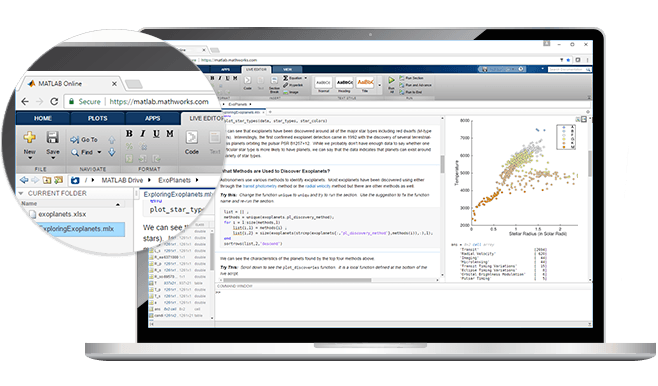
Connect to Data and Scale Using Cloud Compute
When analyzing large data sets or developing artificial intelligence (AI) models, there are different options for storing data in the cloud, including object storage, databases, and more. You can connect to the data you need using MATLAB interfaces to popular services likeAmazon S3,Azure Data Lake, andGoogle Storage. It is often not feasible or is very time-consuming, to copy large amounts of data into a local environment. Co-locating MATLAB with your cloud-hosted data minimizes data transfer costs and provides the flexibility to scale to additional compute resources.
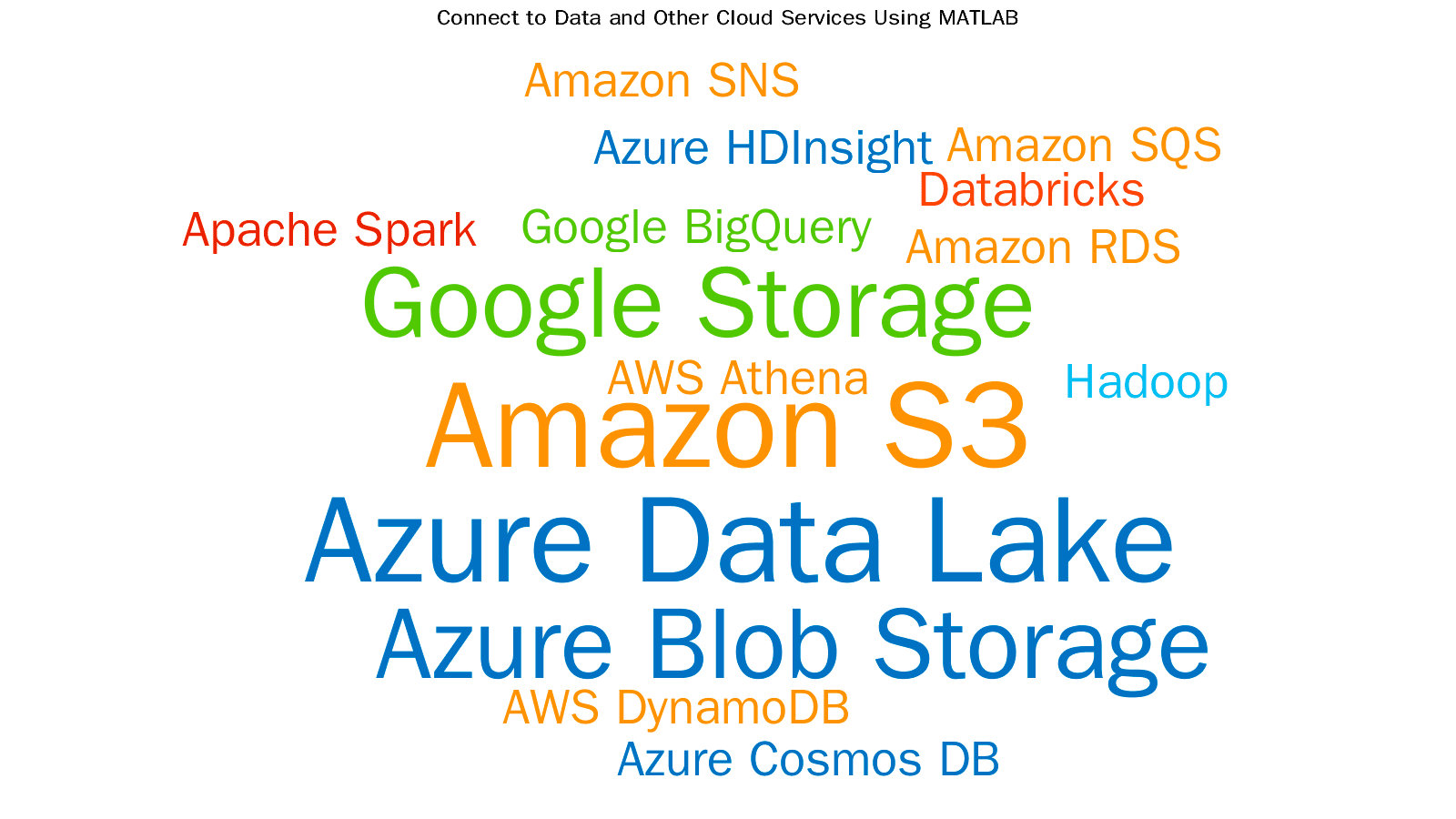
Use MATLAB in public cloud platforms such as AWS or Azure to develop and scale your MATLAB algorithms and Simulink simulations using high-end cloud compute resources like multi-CPUs, multi-GPUs, or clusters. WithCloud Center, you can create, access, and manage MATLAB and MATLAB Parallel Server™ on AWS using your cloud credentials. Alternatively, if your organization uses AWS or Azure Marketplaces, you can take advantage of several Marketplace offerings provided by MathWorks.
For IT Administrators:To get started, IT administrators can customize and provision cloud resources using one of the manyreference architectures available on GitHub®to meet your organization’s specific needs. These reference architectures automate the process of deploying products like MATLAB, Simulink, MATLAB Parallel Server, MATLAB Production Server™, and more in public cloud environments.
Learn More
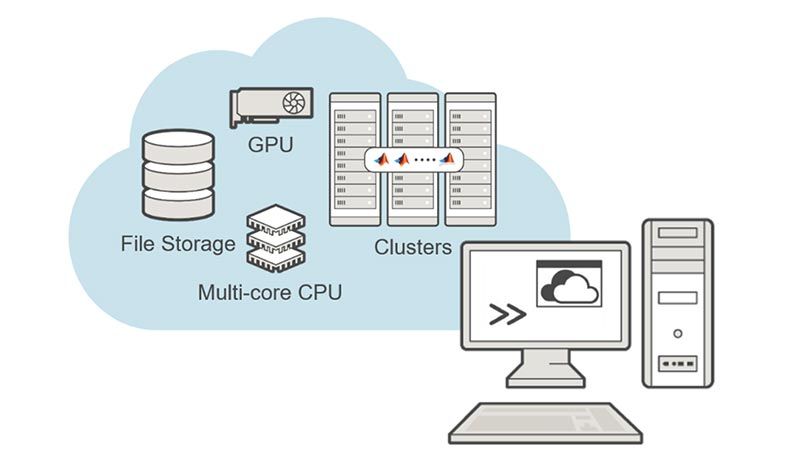
Integrate MATLAB into Automated Test Environments
To automate code testing and improve code quality, you can integrate MATLAB into your automated test environments and continuous integration (CI) systems.
Cloud-Hosted CI Services:Use CI to automatically test and验证和仿真软件MATLAB代码模型,万博1manbetxbuild MEX files, generate code, and package toolboxes or libraries for deployment. For your projects inGitHub, you can run MATLAB in a cloud-hosted CI service likeAzure DevOps,Circle CI®,GitHub Actions, orTravis CI.
Containers:For customized integration with cloud-based CI/CD systems, use MATLAB in a container to have the software packages that you need from wherever you need them in a reproducible manner. To build a MATLAB container from scratch, you can use theMATLAB Dockerfile reference architectureavailable on GitHub. To get started quickly, a prebuilt MATLAB container is available onDockerHub. For deep learning workflows, there is also a prebuilt container onDockerHubdesigned to take full advantage of NVIDIA®GPUs.
Operationalize and Deploy to Production Cloud Environments
Use on-demand compute resources in the cloud to operationalize and deploy MATLAB analytics and algorithms to production IT systems. Share browser-based web apps or incorporate custom analytics, machine learning models, deep learning models, or Simulink simulations into production enterprise applications and run them on public clouds like AWS or Azure.
For IT Administrators:To get started, IT administrators can integrate MATLAB analytics into enterprise applications and scale server instances in AWS or Azure usingreference architectures available on GitHubfor MATLAB Production Server and MATLAB Web App Server™. Marketplace offerings onAWSandAzureenables your organization to use MATLAB Production Server and pay-as-you-go (PAYG).
